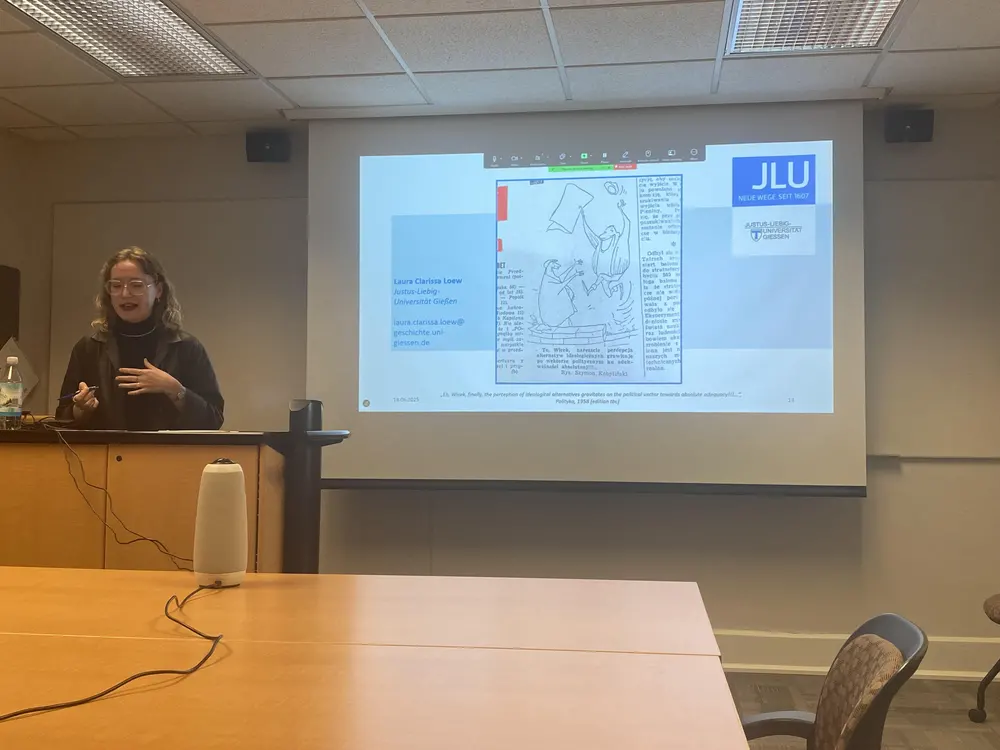
As a result of World War II, the newly founded socialist Polish state faced unprecedented changes in economic, social, and political life. Against the backdrop of the need for reconstruction, forced industrialization, and the establishment of a new socialist statehood, the narrative of “social advancement” emerged as one of the leading promises of Socialist Poland. The discourse on social advancement in the post-war People’s Polish Republic was the main topic of this year’s Fisher Fellow lecture, “Not ‘from Dishwasher to Millionaire’, but ‘from Peasant to Farmer’: the Politics and Narratives of Social Advancement in the Polish People’s Republic,” given by Laura Clarissa Loew on June 18. Loew is a PhD student and a research assistant at the Department of History at Justus Liebig University in Giessen, Germany.
Loew’s theoretical approach is framed by European social history (for instance, Hartmut Kaelble. Sozialgeschichte Europas 1956 bis zur Gegenwart, 2007) and the so called “people’s history of Poland” (for instance, Adam Leszczyński. Ludowa historia Polski: historia wyzysku i oporu: mitologia panowania, 2020). Loew draws on a range of primary sources, including newspapers, political decrees, legal texts, archival materials, and competition memoirs. The latter is a specific type of “mass-memoire”, i.e., autobiographic texts collected by sociologists through a public call that are usually devoted to the recollections of historical events or everyday life. As Loew explained in her lecture, socialist narratives of social advancement went beyond individual success, like job promotions. They emphasized collective improvements in living standards as part of a broader project of modernization. For example, new forms of infrastructure, such as after-work clubs, were created, and teenagers were expected to participate in newly organized programs. Additionally, continuing education schools in agriculture were established to professionalize the farming industry.
Until the end of the 1940s, individual social upward mobility was primarily driven by the need to compensate for wartime losses, and work qualification as a criterion for employment could overshadow any possible divergences from socialist ways of thinking in a candidate. The ideological fit of a candidate came to the forefront of the hiring and job promotion process around the late 1940s when the professional development of workers and peasants in political and economic spheres became an essential part of the Stalinist ideological consolidation. The Thaw period brought about critical reflection on these narratives from the past, leading to a significant setback in cases of individual social advancement. Interest in social advancement grew significantly in the 1960s, becoming widely discussed, studied, and historicized. By the 1970s, both the socialist narrative of social advancement and the belief in its modernizing force had eroded, as more and more social groups that had formed a crucial pillar of socialist society, such as physical workers and leftist intellectuals, became alienated from the socialist bureaucracy.
This talk provided an overview of Loew’s dissertation project, which is currently in progress. Later this year, she plans to undertake archival research in Poland that will help her situate the cases of collective infrastructure for social advancement, with a focus on the cities of Łódź and Lublin.
The Fisher Fellow Award is presented annually in honor of Dr. Ralph Fisher, the founder of REEEC, the SRL, and a champion for building the Slavic collection at the University of Illinois Library. Thanks to Fisher’s vision, the University Library and Slavic Reference Service provide a consummate collection and outstanding research support service to junior scholars around the globe. The award is generously funded in part by the U.S. Department of State’s Title VIII Program.
--
Karina Povsteva is a PhD student in the Department of Slavic Languages and Literatures, University of Illinois Urbana-Champaign, and a summer graduate assistant at REEEC. Her research is focused on pedestrian mobility and children’s street life regulation practices in the big Soviet cities in the 1920s-1930s.